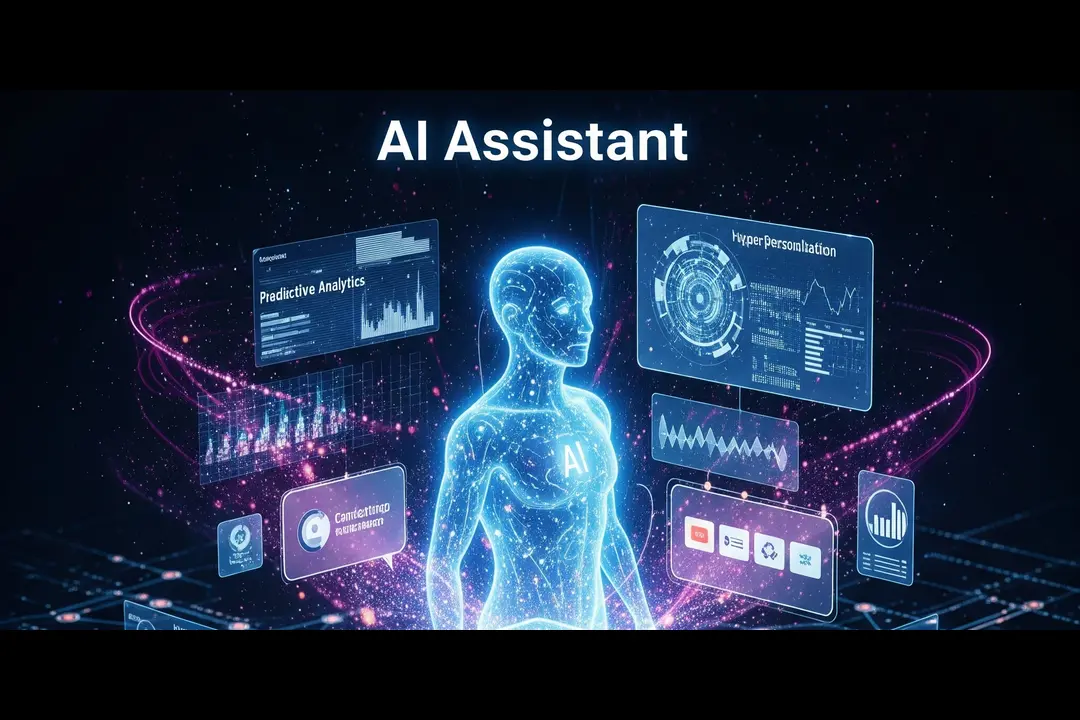What is AI in marketing?
Artificial Intelligence in marketing refers to using smart algorithms, machine learning, and data-driven systems to make marketing efforts more personalized, efficient, and scalable. From automated content creation to customer behavior prediction, AI in marketing is transforming how brands interact with their audiences.
Evolution of AI in digital marketing
Once a futuristic concept, AI has now become a cornerstone in digital marketing. It began with chatbots and basic automation but has evolved to include hyper-personalization, predictive analytics, content generation, and full-scale campaign optimization.
Benefits of Artificial Intelligence in Marketing
Enhanced efficiency and automation
AI handles repetitive tasks—like scheduling emails, analyzing customer data, and managing social media posts—freeing marketers to focus on strategy.
Real-time decision-making
Machine learning models can instantly analyze performance data and adjust campaigns in real-time, helping marketers optimize spend and engagement.
Personalized customer journeys
AI enables individualized marketing strategies by studying customer preferences and behavior to tailor interactions, increasing loyalty and conversion rates.
Generative AI in Content Creation
AI content creation: Overview
Generative AI uses large language models to create text, visuals, audio, and video. It powers tools that generate blog posts, product descriptions, and even social media updates.
How to use generative AI for marketing content
Brands use tools like Jasper, Copy.ai, and ChatGPT to brainstorm ideas, write copy, and enhance SEO. These tools improve output speed and maintain consistency.
AI writing tools
- Jasper
- Writesonic
- Copy.ai
- ChatGPT
- GrammarlyGO
AI for blog posts and social media
You can generate outlines, headlines, CTAs, hashtags, and full-length posts with just a prompt. This automation boosts productivity and content freshness.
Ethical considerations of AI content
Ethical AI usage involves transparency, plagiarism checks, and maintaining a human editorial voice. Content should be fact-checked and not misleading.
Hyper-Personalization with AI
AI personalization explained
AI personalization involves using AI to create unique user experiences based on behavior, location, demographics, and interaction history.
Real-time personalized marketing campaigns
Marketers can send messages at the perfect time, through the right channel, with content tailored specifically to each user.
Tailored content & dynamic delivery
- Dynamic website experiences
- Individualized email offers
- Adaptive mobile app UI
AI-enhanced customer experience
AI chatbots and virtual assistants provide instant support, improving customer satisfaction and reducing bounce rates.
Predictive Analytics in Digital Marketing
Predictive marketing AI overview
Predictive analytics leverages historical data to forecast future customer actions. It helps marketers plan effective strategies in advance.
How AI predicts consumer behavior
AI analyzes browsing history, previous purchases, and engagement patterns to recommend the next best action.
Forecasting sales and ROI
Tools like Salesforce Einstein and HubSpot use predictive models to anticipate campaign outcomes and revenue potential.
Data-driven decision-making using AI
Marketing teams gain insights to fine-tune content, timing, and targeting—reducing guesswork and increasing accuracy.
AI-Enhanced Automation
Marketing automation with AI
From lead nurturing to CRM integrations, AI marketing automation simplifies workflows and improves performance.
AI for email marketing and campaign optimization
Smart segmentation, triggered email sequences, and real-time personalization are all enhanced with AI.
A/B testing and workflow automation
AI can test hundreds of variations quickly, revealing what resonates most with your audience. It also automates complex marketing flows.
AI Tools for Marketing in Every Year
Best AI tools for marketing automation
| Tool | Purpose |
|---|---|
| HubSpot | CRM + automation |
| Marketo | Campaign management |
| Zapier + ChatGPT | Workflow automation |
| Persado | AI copywriting |
| Seventh Sense | Email timing optimization |
AI-powered product description generators
These tools can craft engaging, SEO-rich descriptions in seconds, ideal for e-commerce platforms.
Top tools for predictive analytics
- Google Cloud AI
- IBM Watson
- Salesforce Einstein
- Adobe Sensei
Developing an AI Marketing Strategy
Integrating AI into your current strategy
Start by identifying bottlenecks AI can solve—like content bottlenecks or low personalization. Introduce AI in phases.
Aligning AI with customer journeys
Use AI at every customer touchpoint—from ad targeting to post-purchase follow-up—for maximum ROI.
Metrics to track success
- Customer engagement
- Conversion rates
- Retention rate
- Content performance
Challenges of AI in Marketing
Ethical considerations
Biased algorithms, lack of transparency, and manipulation risks must be managed responsibly.
Data privacy and trust issues
Compliance with GDPR, CCPA, and other regulations is critical when using AI to process personal data.
Limitations and dependency concerns
Overreliance on AI can lead to creative stagnation. Human oversight is still essential.
Future of Marketing AI
Upcoming trends in AI and digital marketing
- Voice search and conversational AI
- Augmented reality marketing with AI
- AI-generated video content
AI’s role in shaping the marketing industry
AI will become a co-pilot for marketers, handling execution while humans drive creativity and empathy.
AI and human collaboration
The future is not man vs. machine—but man + machine. Success comes from strategic collaboration.
Case Studies: Real-World AI Marketing Successes
AI in E-commerce
E-commerce giants like Amazon use AI to power everything from product recommendations to dynamic pricing and personalized email campaigns. With AI-powered product description generators and customer behavior prediction models, they boost conversions and reduce cart abandonment.
Example:
Shopify stores leveraging tools like ReConvert and ChatGPT have seen a 25% increase in upsells and cross-sells by implementing smart recommendation engines and automated thank-you pages.
AI in SaaS and Service Industries
SaaS platforms like HubSpot and Mailchimp integrate AI for personalized onboarding, customer segmentation, and predictive churn analysis. This allows companies to retain users and optimize lifetime value.
Example:
A SaaS CRM provider used AI for email content optimization and saw a 20% uplift in open rates within 3 months.
AI in Social Media Marketing
AI helps brands craft tailored social media content. Platforms like Lately.ai and Canva Magic Write generate post copy, images, and posting schedules based on trending data.
Example:
A digital agency used Lately.ai to repurpose blog content into over 100 social media posts, increasing organic engagement by 43%.
Measuring ROI of AI in Marketing
KPIs and Analytics Tools
Measuring the success of your AI efforts is crucial. Key Performance Indicators (KPIs) include:
- Conversion Rate
- Cost Per Acquisition (CPA)
- Customer Lifetime Value (CLTV)
- Engagement Rate
- Campaign ROI
Tools to track these:
| Tool | Key Features |
|---|---|
| Google Analytics 4 | Predictive audiences, engagement metrics |
| Tableau | Visual dashboards for AI data |
| Adobe Analytics | Real-time marketing performance |
| HubSpot | Attribution reporting, AI-assisted insights |
Long-term performance improvements with AI
AI doesn’t just offer short-term wins—it enables long-term marketing evolution. As the models learn from historical data, predictions and automation become increasingly precise, leading to sustained growth and optimized spending.
Best Practices for AI Marketing Success
Continuous learning and optimization
AI is not a “set and forget” solution. Regularly review performance, retrain models, and fine-tune strategies.
Choosing the right AI tools
Not all tools are created equal. Focus on solutions aligned with your business goals, team capacity, and marketing channels.
Staff training and integration
Ensure your team understands how to collaborate with AI. Provide training to bridge the knowledge gap between marketers and technologists.
Frequently Asked Questions
What is AI in marketing?
How does AI change digital marketing?
What are the best AI tools for marketing automation?
What are the benefits of AI in marketing?
What are the challenges of AI in marketing?
What is the future of AI in digital marketing?
Conclusion
Summary of Key Points
AI is no longer a futuristic buzzword—it’s a game-changing force in marketing today. From generative content creation to real-time customer personalization, predictive analytics, and automation, AI in marketing offers unmatched potential.
We explored:
- Generative AI for blogs, social media, and product descriptions
- Hyper-personalization to improve user experience
- Predictive analytics for smarter strategy
- Automation to streamline operations
- Top tools and strategies for success
Final Thoughts on Embracing AI for Marketing Success
Embracing AI means evolving with the times. Businesses that adopt AI thoughtfully will enjoy faster growth, stronger engagement, and better returns. But the human touch remains vital—use AI as a partner, not a replacement. Together, marketers and machines can build a more intuitive, impactful future.


